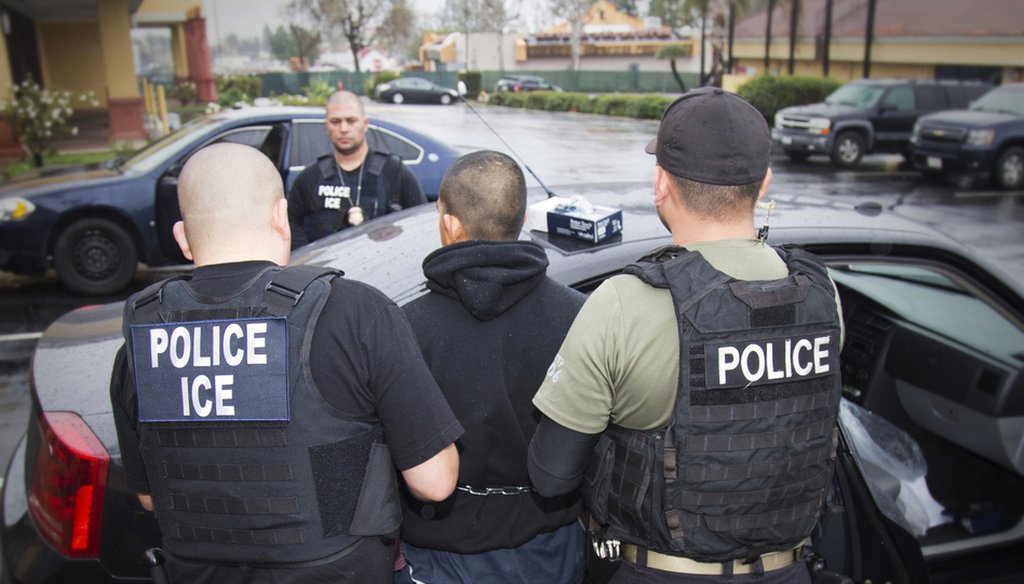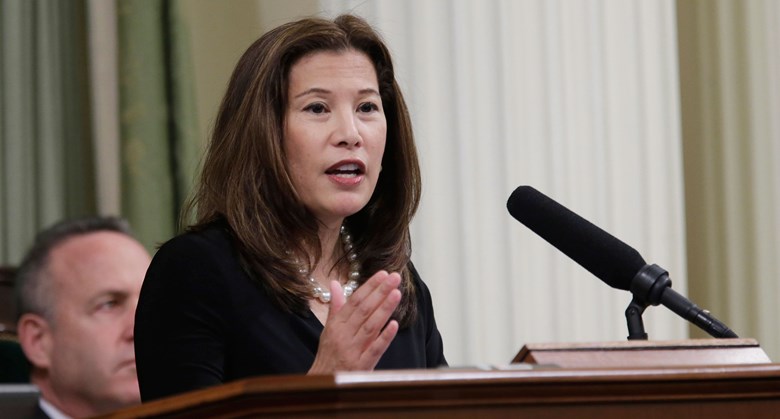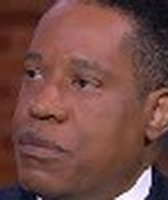Stand up for the facts!
Our only agenda is to publish the truth so you can be an informed participant in democracy.
We need your help.
I would like to contribute

A photo released in February 2017 by U.S. Immigration and Customs Enforcement shows people being arrested during an ICE operation.
California’s supreme court chief justice and immigrant rights groups criticized ICE last month after the federal agency arrested an undocumented man inside a local Sacramento courtroom.
The unusual move is believed to be the first by the U.S. Immigration and Customs Enforcement Agency inside a Sacramento Superior Court room and follows multiple arrests by the agency inside Fresno’s local courthouse earlier this summer.
Richard Rocha, an ICE spokesman, said California’s sanctuary law has forced the agency to make more arrests in public places instead of at local jails. That law limits local law enforcement’s ability to cooperate with federal agents, though not for undocumented residents facing serious or violent felonies.
Meanwhile, the courthouse arrests have raised concerns that California’s undocumented community, which includes more than two million people, could stay away from court. Immigrant advocates worry they might avoid paying fines, testifying in trials or even seeking justice for crimes committed against themselves or family, out of fear they’ll be arrested and deported.
Criticism from state's chief justice
Sign up for PolitiFact texts
California Supreme Court Chief Justice Tani Cantil-Sakauye has acknowledged the courthouse arrests are "perfectly legal." She originally spoke out last year against them, however, saying, "Witnesses and victims will no longer come to court to report or bear witness against the bad guys, and will not report crimes."
Her comments drew a rebuke from U.S. Attorney General Jeff Sessions who criticized her characterization of ICE agents "stalking" undocumented immigrants in courthouses.
The Trump administration green-lighted the arrests in 2017 as part of its strict approach on immigration enforcement. Courthouse arrests by ICE have taken place around the country, from Colorado to North Carolina.
California’s chief justice repeated her criticism of the practice last week.
"I think it’s counter-productive to safety and people’s respect and loyalty to the law. So, I continue to be against that," she told Capital Public Radio.
Unlimited authority?
ICE’s recent courthouse arrests have also spurred questions about how far the federal agency’s authority extends.
PolitiFact California explored that topic with two immigration law experts. We found there are few limits on the agency’s power.
News reports identified the man arrested as 38-year-old Yovanny Ontiveros-Cebreros. The reports said he pleaded not guilty to two felony charges, including possession of a controlled substance and possession of a controlled substance for sale, before he was arrested by an ICE agent inside the courtroom.
Rocha, the ICE spokesman, said the federal agent had a criminal warrant for the man’s arrest.
With that warrant, said UC Davis Law School Dean Kevin R. Johnson, an expert on immigration law, there’s little that would prevent the arrest.
"It’s hard to say that the state court judge has any legal authority over the federal government in that circumstance," he said.
Still, Johnson said, the arrests raise questions about due process.
"What if the person is too afraid to go and protect his or her rights in the courthouse?" he questioned. "Is that a due process violation? Does it really preclude the person from having their day in court?"
The only limits are ‘self-made’
Blake Nordahl, the supervising attorney at the Immigration Clinic at the McGeorge School of Law in Sacramento, summed up ICE’s power this way:
"The limits are essentially self-made through their own internal policies," he said. "ICE can make arrests if they have probable cause in a public place."
Nordahl added that ICE continues to follow a 2011 memo issued by the agency describing "sensitive locations" where ICE agents would not make arrests. Those include schools, hospitals, places of worship and public marches and rallies. Courthouses were never on the list, though Cantil-Sakauye has argued they should be added.
Nordahl said the courthouses arrests in California are unusual but not unprecedented.
"There were reports of it happening back in 2012 and 2013," he said. "But there was public outcry about it and the practice stopped. And it has been restarted in the last two years."
Rocha, the ICE spokesman, said arrests at courthouses reduce public safety risks because individuals have already been screened by security. He said the agency has no plans to stop arrests at courthouses.
Some state lawmakers in California hope Senate Bill 349 will change that, at least for civil arrests. The bill would "clarify the power of judicial officers to prevent activities that threaten access to courthouses, including by protecting the privilege from arrest."
It would add that "no person shall be subject to civil arrest in a courthouse while attending a court proceeding or having legal business in the courthouse, and that a violation of these provisions constitutes contempt of court."
The bill was approved by the state Assembly and Senate in late August and sent to Gov. Jerry Brown for consideration.
Our Sources
Kevin R. Johnson, dean of UC Davis Law School, phone interview, Aug. 28, 2018
Blake Nordahl, supervising attorney, Immigration Clinic at McGeorge School of Law, phone interview, Aug. 28, 2018
Richard Rocha, spokesman, U.S. Immigration and Customs Enforcement, phone interview, Aug. 24, 2018
Tani Cantil-Sakauye, California Chief Justice, interview with Capital Public Radio, Aug. 28, 2018
Capital Public Radio, ICE Arrests Undocumented Man Inside Sacramento County Courtroom, Aug. 24, 2018
Capital Public Radio, Feds Say Courthouse ICE Arrests Necessary, March 31, 2017
Sacramento Bee, ICE ‘surprise’ arrest in Sacramento courtroom could have chilling effect across state, Aug. 24, 2018
Senate Bill 349, text, accessed September 2018



















































